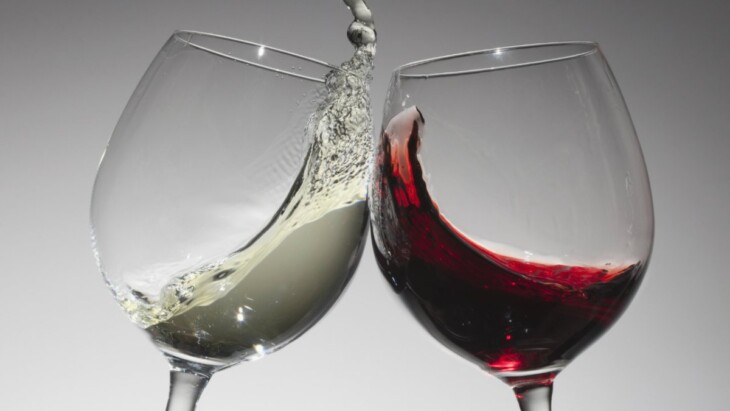Many people love to end their day with a glass of their favorite wine and a good book. Wine can also make a delicious meal more satisfying. If you’re a wine lover, you may have already tried the white and red variety. But do you know which one is better for your health? First, let’s learn more about white and red wines.
Contents
White Wine Vs. Red Wine: Their Differences

img source: mensjournal.com
France and Italy are considered the origin of many types of wines, although wine is also produced in other countries like Spain, the United States, Australia, and Argentina. White wine is an alcoholic beverage made from the fermentation of uncolored pulp of grapes without skin. According to WineO Mark, Chardonnay, Riesling, Pinot Grigio, and Sauvignon Blanc are some of the most popular types of white wine.
People who enjoy drinking red wine are likely familiar with the names Cabernet Sauvignon, Merlot, Pinot Noir, and Shiraz. Unlike white wine, red wine is produced by fermenting the grapes with the skin and this causes the rich, red color. There are also differences in flavor between red and white wine.
In general, white wine has a crisp, fruity, and aromatic flavor while red wine has a velvety, richer, and robust flavor. Certain types of food taste better paired with a specific kind of wine; for example, Cabernet Sauvignon (a full-bodied red wine) is best paired with hearty red meat dishes.
Wine Health Benefits: Is Red Better Than White?

img source: incitasecurity.com
The differences between red and white wine go beyond their origins or flavor. While both white and red wine has health benefits, one may be more superior to the other. Which is better for your health—red or white?
Nutritional Value
Wine is known to provide several health benefits for the body. But it’s important to take note that certain wines are better than others based on content:
- Calorie Content
In general, sweet wines, white or red, contain more calories than dry or high-alcohol wine. However, the carbohydrate content of wine also depends on how dry or sweet it is. So, a glass of dry red wine like Shiraz may contain fewer carbohydrates than the same amount of sweet white Riesling.
The primary source of calories in wine is the alcohol content, followed by sugar and carbohydrates. If your goal is to lose weight, you are better off choosing a lower-carbohydrate, lower-calorie dry, sparkling white wine or varieties like Merlot, Pinot Grigio, and Sauvignon Blanc—you can read the full info here.
- Nutrients
A 5oz glass of wine, whether red or white, contain the following nutrients: calcium, magnesium, potassium, riboflavin, and vitamin B6. However, despite the nutrient content of wine, it’s best to consume it moderately.
Health Benefits

img source: raylenvineyards.com
Some studies suggest the many health benefits of wine. Resveratrol, the main beneficial compound in red wine, may improve health in different ways. Resveratrol is a compound found in grapes and other foods like blueberries, cocoa, cranberries, pistachios, peanuts, and red wine. Here are other things to know about resveratrol:
- Resveratrol is also a powerful anti-mutagen, which means that it prevents cell mutation that may lead to cancer. Because of this powerful ability, resveratrol, according to some studies, may be used to prevent and treat cancer. However, while there’s insufficient evidence to support this claim, researchers still find this a promising possibility.
- This compound is found to be extremely effective in reducing inflammation of the arteries, as well as minimizing the risk for blood clots. Its anti-inflammatory properties may help ease joint pain.
- Resveratrol has also been shown to have significant antioxidant effects, making it good for heart and brain health. It protects your brain and helps lower blood pressure.
- Some studies also suggest that resveratrol may increase sensitivity to insulin, lower cholesterol, and reverse aging.
While it may not have the same amount of resveratrol content as red wine, white wine contains compounds that make it worth drinking, too. Here are the benefits of drinking white wine:
- Caffeic acid is a phenol present in white wine that may reduce the risk for kidney and heart problems. White wine may also help in lowering bad cholesterol.
- White wine benefits heart health by helping repair the linings of the blood vessels.
- Although red and white wine has a positive impact on lung function, studies suggest that wine has a greater impact than the red variety.
- Like red wine, white wine contains antioxidants that help protect against cognitive decline.
Apart from these benefits, white wine tends to have fewer calories than red wine and has lower alcohol content.
The Verdict: Red Wine Wins

img source: departures.com
While the spotlight has always been on red wine and its positive impact on health, white wine has health benefits, too. Red wine, however, contains more resveratrol as the skin of the grapes is included during fermentation. Red wine is rich in polyphenols that play a variety of roles in preventing free radical damage and keeping organs healthy.
People who consume red wine enjoy a significant decrease in all-cause mortality relative to those who consume less or none at all. This decrease in mortality is believed to be, in large measure, due to the fact that red wine contains large amounts of polyphenols, antioxidants that help fight free radicals and reduce damage to the heart by arteries, vessels, and the like.
Additionally, polyphenols have been found to inhibit the growth of artery-clogging bacteria, which further reduces the risk of heart attack and stroke in humans.
Although moderate intake of red and white wine may help lower your risk of various diseases, your overall lifestyle is still the real culprit. Drinking too much alcohol can also cause several health problems. Keep in mind that moderation is key when it comes to drinking wine or any alcoholic beverage.
Takeaway
Wine has been a popular alcoholic beverage choice for thousands of years. The popularity of wine, however, has increased significantly in recent years due largely to publicity, particularly the phenomenon of wine culture and the advancement of scientific knowledge about the overall health benefits of wine consumption. Numerous studies have shown that red wine has several health benefits that make it a better choice than most types of alcoholic beverages. Drinking moderate amounts of red wine with a healthy diet and exercise may help you achieve good health.
